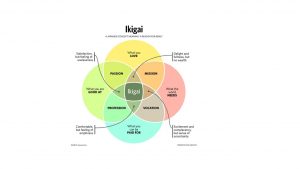The Japanese Concept of Ikigai: A Reason For Living
In recent years, the modern world has been inundated by books, workshops and even public lectures about the importance of finding one’s purpose in life. Those spreading this notion assure their audiences that knowing one’s purpose will not only improve one’s life, but could raise one’s income and lengthen one’s life.
In Japan, the idea of having a purpose – what the French call a raison d’etre – is hardly ground-breaking. The Japanese have long had a word for this sense: Ikigai.
Formed of the words ikiru, or life, and kai, or “the realization of what one hopes for,” ikigai is most often translated to mean “a reason to live.” On the island of Okinawa, Japan’s southernmost and sunniest region, and the one which features the longest living Japanese – indeed, some of the longest-living humans on the planet – it is translated as “a reason to get up in the morning.”
That colloquial saying almost vibrates with the feeling it intends to convey. Ikigai is familiar to most Japanese, something that many Japanese feel is worth taking the time to discover – and discovering one’s ikigai can take time. Asking questions of oneself and managing the answers in a way one can integrate into a coherent sense of purpose is based on asking four initial questions. The questions and the answers can be overlapping, in some profound ways, and all four questions must be answered in order to develop a clear sense of one’s ikigai.
The first question is, What do you love, what is your passion? This question gets at a great motivator in life, especially in the modern world, where many of us are focused on our desires and satisfying them as quickly and as often as possible. What do you love? What would you do if you didn’t have to make money, if you could just follow your heart? This question will resonate with many, but it can also be intimidating. Perhaps the second question is easier.
That second question is, What are you good at? This is the question one asks to discover one’s vocation. For many, the answer is perhaps the same as the answer to the first, but for many, it is not. It is a more practical question, less emotional, and perhaps easier, for we all know on some level what we are good at. We may want to be an actor, that is our passion, but we find ourselves pushed into being the person who runs the box office instead, because we’re good at it. This is our vocation.
The third question is, What does the world need from you? This gets more difficult. It is, ultimately, the question of what your mission is. Why are you here on earth? What can you achieve that will help others, that will make you valuable socially, that will make the world a better place? What do others value about you, aspects of yourself that you may not value so much yourself?
The last question is the most practical, particularly in modern times: What can you get paid for? What is your profession? This, again, is somewhat simpler, since unless you’re still a child, you have had to work to make money. It is also a variation on the third question: What do others value about you, and value enough to give you money to do it?
We can see how the answers to these questions may overlap, or they may be different. When they are all different, how does one manage to combine them, or overlap them, so that all four questions are answered?
One can quite easily get caught up in one or the other of these. Pursuing one’s passion, or focusing exclusively on what makes one money, are ways that we can get out of balance, particularly in the modern world. Fulfilling one’s mission without being able to support one’s family doesn’t work. Making lots of money without any satisfying feelings of passion or mission can leave one feeling empty and unfulfilled. Doing something one loves but which contributes nothing to others may feel self-indulgent.
This is the puzzle of ikigai, and the difficulty of actually figuring out what your distinctive combination may be. It may be that asking these questions produces answers that all fit together and one quickly moves forward, confident in one’s knowledge of his ikigai. But it may not work that way; finding one’s ikigai can be a time-consuming, challenging process.
But that’s why, in the Japanese mind, solving the riddle of one’s ikigai is a process well worth the effort. Together, these four elements can bolster and anchor a well-rounded, satisfying life that provides not just pleasure when one does what one loves, or money when one does what one can be paid for, but a sense that one is fulfilling one’s destiny as well as helping others.
By DAVID WATTS BARTON; http://japanology.org/ AND https://www.weforum.org/







